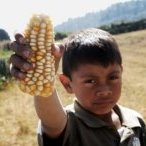English · Español

29 de octubre de 2014 | Entrevistas | Encuentro Monocultivos en América Latina | Acaparamiento de tierras | Anti-neoliberalismo | Soberanía Alimentaria
Resistance in Mexico against plans of transnational corporations to advance GM monoculture plantations in the country
Descargar: MP3 (13.7 MB)
Descargar: MP3 (2.5 MB)
There are many types of monoculture plantations in Mexico, including sugarcane and oil palm, which cause important impacts at socioenvironmental level. However, one of the main threats faced by the Mexican people is GM maize, said Evangelina Nuñez of the Collective for Autonomy and the Network in Defense of Maize, in an interview conducted during the "Latin American Meeting on Large-Scale Monoculture Plantations: Land Grabbing and Threats to Biodiversity and Food Sovereignty".
In this meeting, held in La Ceiba, Honduras, Evangelina said that the Network has been working for over 14 years on this issue, following the policies of the Mexican State around agriculture and verifying how these have weakened the food sovereignty of the country. "All programs and policies implemented aim to favor seed companies. There are programs that give you money to sow maize or beans, such as PROMAE (Maize and Beans Support Program), but the people are required to submit the receipts of everything they buy. This means that they can´t use native seeds anymore.
So, in some places, native seeds have been lost".
In addition, Monsanto and Syngenta have requested a license to grow over 4 million hectares with their GM maize varieties, mainly to the North of the country. The permits to grow these GM varieties have been denied thanks to precautionary measures imposed by the judicial system based on legal requests by social organizations.
According to La Jornada, so far, transnational corporations Monsanto, Syngenta, Dow, Pionner-Dupont and also the Agriculture, Livestock, Rural Development, Fisheries and Food Secretariat (Sagarpa) have submitted 83 requests for permits for commercial, experimental and pilot cultivation of GM maize varieties. The alert in Mexico about the advance of this type of crops is significant, since the country is a center of origin for maize and it has a wide diversity of species (over 60), most of them native. The relevance of these crops to ensure the food sovereignty of Mexico is extremely high given the key role played by maize in the daily food production.
In response to this situation, the Network in Defense of Maize, made up by approximately 1300 peasant, indigenous and social organizations from the whole country has set as one of its main strategies "the defense of maize by growing maize", according to Evangelina.
About how the Mexican popular movements are resisting this, Evangelina made reference to the existence of three types of strategies: organizational, legal and political, "In Mexico, over half of the territory is socially-owned and under the control of indigenous and peasant communities. They have agreed in their community laws to ban GM maize in their lands. This happens in the communities that remain in control of their territories".
Legal actions have been filed in areas where the ownership of land is private, "such as in Campeche, with African palm in Chiapas and with GMOs. There have been legal actions to suspend their cultivation, and in most cases we´ve won. But in some of them, the rulings are not being respected".
The responses in these cases, according to the Mexican activist, rely on political organization. There are campaigns at national level against GMOs and monoculture plantations in general: "The people are organizing themselves in assemblies; we have the National Network in Defense of Maize, and also the National Assembly of Environmentally-Affected People, and there are other networks against mining and dams as well. We are all defending the territory".
Imagen: semillasdeidentidad.blogspot.com








